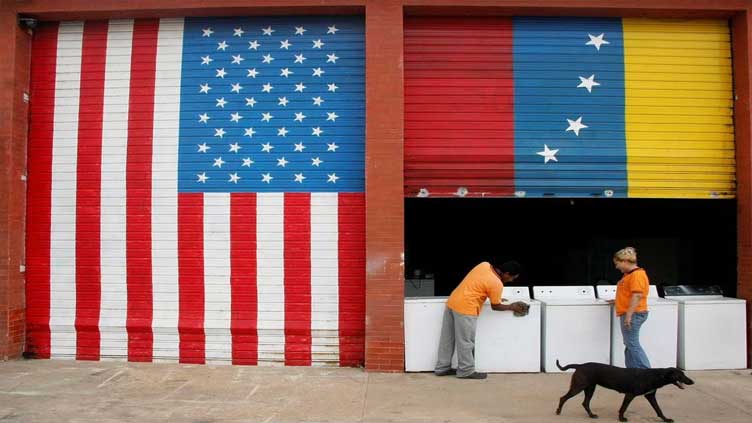Small funds eyeing big gains pile on Venezuela debt

Business
Small funds eyeing big gains pile on Venezuela debt
CARACAS/MADRID/NEW YORK (Reuters) - Small funds and investors outside the United States are looking to increase their exposure to Venezuelan bonds, on the expectation of debt renegotiations or of legal action tied to a looming expiry of repayment rights, investors and four financial sector sources said.
Many of the bonds are trading at pennies on the dollar after a default in 2017, compounded by 2018 sanctions from Washington that barred any American from trading Venezuelan debt.
Investor interest has grown after the renewal of U.S. government permission for oil company Chevron (CVX.N) to operate in Venezuela and the decision by Washington not to block the potential seizure by creditors of shares in Venezuela's most important offshore asset, oil refiner Citgo Petroleum Corp.
Also key is the upcoming October deadline after which some holders of Venezuelan government debt could lose their right to ask courts to order repayment.
Some of the funds buy debt for their clients in Europe, the sources said. Among the most sought-after bonds is the PDVSA 2020, whose guarantee is half of the shares of Citgo.
Funds such as Altana Credit Opportunities Fund, based in London; Copernico Recovery Fund, in the Cayman Islands; Canaima Capital Lux, in Luxembourg; and Auriga Global Investors, a brokerage housed in Madrid, have been buying bonds from holders who have not collected principal and interest for almost six years.
"The vast majority of bondholders are creditors in favor of a consensual restructuring of Venezuela's debt. They would only act legally if there was no extension of the prescription," said Francesco Marani, head of negotiation at Auriga Global Investors. "Creditors need more clarity from the Biden administration."
Auriga's clients have positions in Venezuelan debt of over $100 million, Marani said.
Although the purchases of those funds represent a small portion of the more than $60 billion in outstanding bonds, they are quoted in pennies on the dollar and there are hopes for big gains.
THE BUYERS
"More and more people invest money in our fund each month, the more optimistic they are on the time scale," said Lee Robinson, CIO of Altana Credit Opportunities Fund.
"You want to be long Venezuela and PDVSA. Even on a 10-year view, it's a great trade. The recovery is going to be significantly higher than almost any other distressed sovereign that is out there at the moment," Robinson added.
Other distressed sovereigns include Ukraine, Ghana and El Salvador, among others.
Altana filed repayment claims in 2020 and has continued to buy Venezuela and PDVSA bonds, of which it said it holds over 1% of the total outstanding debt, over $500 million at par value.
"We filed our claims in the U.S. courts and none of the other European funds have done that as yet," Robinson added.
The Copernicus Recovery Fund, run by Copernicus Capital Partners and Venezuelan firm NTN Consultores, said it holds about $500 million in bonds at par and is looking to take on more.
"The fund is focused on Venezuelan debt," said Jorge Piedrahita, an adviser to Copernicus and a manager at consulting firm Gear Capital Partners. "The bonds are bought and the holders are given shares of the fund."
Luxembourg-based Canaima Fund Lux in November launched an investment vehicle to pool European holders ahead of possible legal action against the government. The fund did not respond to requests for comment.
In addition to Altana, six other funds have filed claims in U.S. courts for non-payment and a trial for the annulment of the PDVSA 2020 bonds is currently in process in New York.
NEGOTIATIONS NIGH?
The president of PDVSA's ad hoc board, Horacio Medina, said in May that Citgo cannot pay all its debt, but is willing to negotiate some payments.
Citgo could be valued at $13 billion.
U.S. investors had controlled between 75% and 80% of the sovereign and PDVSA debt, according to a May report by the Chatham House think tank, but that figure has shrunk to between 50% and 55% over five years because of sanctions.
"Between $15 billion and $20 billion of debt held by (investors from) the United States has migrated to other holders," it said.
Venezuela's opposition legislature - recognized by the U.S. as its last democratic body - is licensed by the U.S. Treasury Department to carry out debt settlements with the government and PDVSA.
A creditor group has asked the opposition to back a government proposal to suspend the statute of limitations on repayments for defaulted paper, but the opposition has not yet answered.
Several investors said that in an eventual debt renegotiation they could accept stakes in oil or shares in state companies in exchange for payments.
"Many (investors) are still lobbying in the United States for the possibility of negotiating with Venezuelan bonds," added one of the sources.

